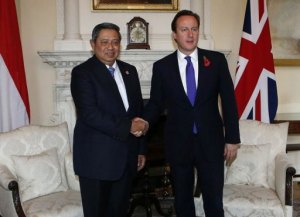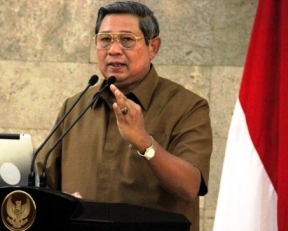
Britain’s Prime Minister David Cameron shakes hands with Indonesian President Susilo Bambang Yudhoyono
“They had constructive discussions on a number of subjects, with the focus on the UK-Indonesian trade and investment relationship,” said a spokeswoman for Cameron’s Downing Street office.
On the second day of Yudhoyono’s state visit to Britain, aimed at boosting ties with the emerging Asian power, the two leaders and Liberia’s President Ellen Johnson Sirleaf also chaired talks in London on global efforts to fight poverty.
The Downing Street spokeswoman said Cameron and Yudhoyono had sealed a defence deal which would boost cooperation in “research and development, investment and production”.
They also announced a £7.5 billion ($12.1 billion, 9.3 billion-euro) deal for BP to develop liquid natural gas in Indonesia, and signed an agreement strengthening links between the two countries’ universities.
Cameron’s spokeswoman added that while he had praised Yudhoyono for “his leading role in Indonesia’s transition from autocracy to a vibrant democracy”, the pair had discussed the protection of human rights in regions such as Papua.
The two leaders and Johnson Sirleaf had earlier chaired a panel of politicians from 26 countries charged with developing an anti-poverty strategy after the Millennium Development Goals expire in 2015.
The eight goals, established in 2000, set targets on improving education, health and women’s rights, ending hunger, and protecting the environment.
Cameron said he believed world leaders now had a real opportunity to eradicate poverty.
“That is something politicians have been talking about for a while — but for the first time I believe this generation really has the opportunity to do it,” he said after the meeting.
“We think the Millennium Development Goals have made great progress. There’s more progress to be made between now and 2015, but we’re clear the next stage should be aiming to eradicate absolute poverty in our world completely.”
The panel is meeting for three days in London, the second of four rounds of talks before it reports back to UN Secretary General in May next year.
On Friday, the final day of Yudhoyono’s state visit, he will address officials at the Foreign Office and meet with Indonesian business figures.
Queen Elizabeth II hosted a glittering banquet in honour of Yudhoyono and his wife Ani on Wednesday night, after formally welcoming them with a guard of honour and a ride in her ceremonial carriage.
Source: AFP

